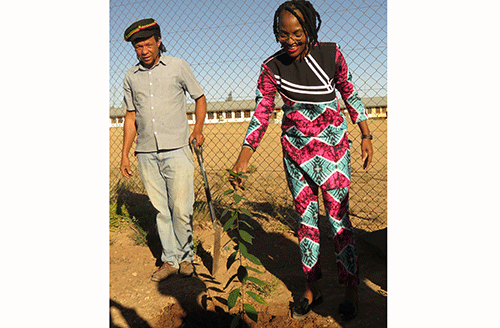Absalom Shigwedha
The conversion of land to agriculture and the creation of urban settlements, as well as the overexploitation of natural resources is one of the main drivers of biodiversity loss in Namibia, the deputy minister of environment, forestry and tourism has said.
Heather Sibungo made these remarks at Namibia’s national event to mark the 2023 International Day of Biological Diversity, held at the village of Gibeon in the Hardap region last Saturday. Sibungo said other drivers are climate change, alien invasive species and pollution.
She said in the fight against biodiversity loss, Namibia has declared more than 10% of its marine and coastal ecosystems into protected areas – and together, Namibia’s terrestrial and marine ecosystems contribute significantly to global climate change mitigations through its National Determined Contributions.
Biodiversity resources, she said, are the foundation upon which Namibia builds and develops its economy to improve the welfare of its citizens.
“Protecting, managing, maintaining and restoring terrestrial forests is the mandate of their ministry, carried out through the implementation of the Forest Act of 1995 as amended.
“The ministry has nurseries across the country and provides extension services to the development of orchards and tree planting in general. The ministry also carries out forestry research services, compiling forestry inventories as well as Namibia’s biodiversity taxonomy,” she said.
Biodiversity is defined as genes, species and ecosystems on earth on which human beings hugely depend for their survival.
She said Namibia is committed to the full implementation of the Kunming-Montreal Global Biodiversity Framework, which was adopted at the 15th Conference of the Parties to the Convention on Biological Diversity held in Kunming (China) in 2022.
Subungo said the adoption of the framework is a historic achievement for the Parties to the Convention, and the focus is now on the immediate implementation of this international agreement.
Namibia, she said, has already started the process of implementing the Kunming-Montreal Global Biodiversity Framework by engaging stakeholders to review the achievements and implementation of its first National Biodiversity Strategy and Action Plan (NBSAP 1) to inform the formulation of Namibia’s NBSAP 2 for 2022-2030.
At the same occasion, councillor for the Gibeon constituency Paul Isaak said the Gibeon community owes a lot to biodiversity, as their livelihoods mainly depend on livestock and plant species, adding that their cultural way of life is also attached to biodiversity in the area.
Isaak said some human actions lead to the loss of biodiversity and damage the environment in general.
He gave an example of an area in the Asab area – a village in the Gibeon constituency that is currently turning into a desert due to unsustainable harvesting of Acacia Karoo tree species.
The tree is harvested to make housing structures, he said, adding that when he heard about this sad news, he instructed some of his officials to go to the area to stop the practice.
Chairperson of the Gibeon Village Council Sharon Bezuidenhout said the fact that the government decided to host the 2023 national event to mark the 2023 International Day for Biological Diversity at Gibeon is a testimony that they care about biodiversity.
She said she hopes that the event will further enlighten the Gibeon community on the importance of biodiversity conservation and the sustainable use of its components.
This year’s International Day of Biological Diversity was commemorated under the theme ‘From Agreement to Action: Building Back Biodiversity.’
Biodiversity is defined as genes, species and ecosystems on the planet that people hugely depend on for their livelihoods.
*Absalom Shigwendha is a freelance Agriculture and environment journalist


